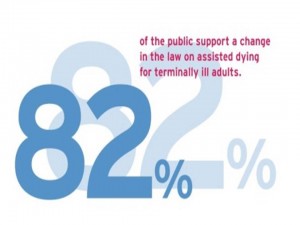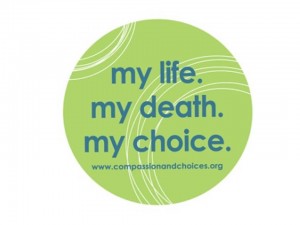What does it mean to die with dignity?

In 1977, Oregon passed the Death with Dignity Act, which is a bill allowing people with a terminal illness and six months or less to live, have the choice to end their lives in a humane way. The “right-to-die” movement picked up speed after the death of Brittany Maynard. Maynard had brain cancer and was diagnosed with six months to live. She decided to move to Oregon where she could chose to end her life when she felt the time was right. Her story spurred the movement for dying with dignity. Along with Oregon, Montana, Washington, Vermont, and California are currently the only states in the US that have passed this bill. There is a need for this law to be implemented nationwide, so all patients can have the same end of life options.
End of Life Option Act
The most recent state to pass this bill is California, where it passed on October 5th, 2015. The bill, called The End of Life Option Act or Assembly Bill x2-15, was signed by Governor Jerry Brown. According to Euthnasia.procon.org, the state legislature must adjourn on a special meeting about health care before the law will take effect, which will not be until January 2016 at the earliest.
“I do not know what I would do if I were dying in prolonged and excruciating pain…however, it would be a comfort to be able to consider the options afforded by this bill. And I wouldn’t deny that right to others.”
– Governor Jerry Brown
Patient eligibility in California, According to Euthansia.procon.org
- Must be at least 18 years old
- Resident of California
- Six months or less until death is expected
- Can communicate and make health decisions for him/herself
- Mentally and physically able to administer the aid-in-dying-drug
The facts according to the Oregon Public Health Division
- In Oregon since 1997, prescriptions have been written for 1,327 people and 859 patients have chosen to end their lives legally prescribed medication
- .Patients must also have at least one consultation with a state licensed psychiatrist or psychologist to make sure the patients is not suffering from a mental illness or depression, which might affect their judgment. This applies to all states with the law.
- The attending physician, psychiatrist, or psychologist must also say the person is able to communicate health care desires to the health care professionals. This applies to all states with the law.
- In Oregon, the most prescribed drug is Secobarbital, which is a capsule, followed by Pentobarbital, which is a liquid.
- As in previous years, the three most frequently mentioned end-of-life concerns were loss of autonomy (91.4%), decreasing ability to participate in activities that made life enjoyable (86.7%), and loss of dignity (71.4%).
- 93% of patients that chose to take drugs were enrolled in hospice care as well
- 100% of the patients that took the drugs also had some type of health insurance
Opposition
According to a Time Magazine article by Josh Sanburn, the main objectors to this bill are physicians, the Catholic Church, and disability-rights organizations (2015). Some physicians do not believe this law coincides with the Hippocratic Oath of “do no harm”. The Catholic Church tends to believe the law devalues the life God gave us. Many people who are in the disability rights organizations are also worried people will be coerced or forced into taking the drugs against their will. Additionally, other say insurance companies could target poor patients and offer to pay for the drugs to end someone’s life, but not for expensive treatments that could save their life (Sanburn, 2015).
A Call to Action/ Recommendation
People should have a choice on how to end their lives when diagnosed with a
terminal illness. Only 5 states have a law making this possible. I recommend the Die with Dignity law be put in place nationwide. People all around the country are suffering and do not have the same rights as those in the five states allowing people to make that choice. Relocating to gain residency is not an option for people who only have six months to live. We need to advocate so all people, no matter where they live, have access to this option. People should have the option to die in a humane and compassionate way, rather than be in pain and suffer.
Currently there is no activity in legislation surrounding this bill in Illinois.
What can you do?
Learn more
Contact elected officials in Illinois
- A template of a letter to lawmakers can be found in the link below
Donate to organizations that work to advocate for this law
- Compassion and Choices
- Can also volunteer with this organization if you live in a state that has the law
- Death With Dignity National Center
- Get involved in a local chapter of Compassion and Choices in Illinois